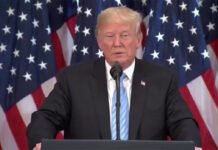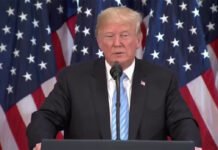Christmas Statement with Global Implications : In a striking Christmas message, former U.S. President Donald Trump has reignited discussions about America’s strategic interests in the Panama Canal and Greenland, while issuing sharp warnings to Canada over immigration and trade. These comments have sparked widespread attention, given their potential geopolitical ramifications.
Trump’s Emphasis on the Panama Canal: A Historical and Strategic Asset
The Panama Canal, constructed over a century ago, has been a cornerstone of global maritime trade. Trump’s latest remarks highlight concerns over Chinese influence in the canal’s operations, a situation he describes as a pressing threat to American economic and national security.
Trump stated, “For over 110 years, the Panama Canal has been a testament to American ingenuity and sacrifice, with 38,000 lives lost during its construction. Yet today, we see foreign powers exploiting this marvel while America stands idle.”
These statements come amid China’s increasing investments in Latin America, particularly its foothold in the Panama Canal region. Trump’s call for revisiting American involvement in the canal underscores its importance as a global trade artery, handling nearly 6% of global maritime commerce.
The Strategic Importance of the Canal
- Economic Significance: The canal facilitates the swift movement of goods between the Atlantic and Pacific Oceans, reducing shipping times by weeks.
- Military Access: As a chokepoint, the canal is a vital element in global naval strategy.
- China’s Growing Presence: With Chinese state-owned companies reportedly managing parts of the canal’s operations, Trump’s concerns align with broader fears about Beijing’s strategic ambitions in the Western Hemisphere.
Trump’s renewed focus on the canal could signal potential future policies aimed at reasserting U.S. dominance in this critical region.
Greenland: America’s Unfulfilled Strategic Aspiration
In his Christmas address, Trump once again broached the idea of acquiring Greenland, a notion he first floated during his presidency. He justified this proposal on grounds of national security and geopolitical necessity, stating, “Greenland’s location and resources are critical to America’s future. Those who truly value freedom understand why the U.S. must have a presence there.”
Why Greenland Matters
- Strategic Location: Situated between North America and Europe, Greenland is a crucial point for monitoring Arctic activity and transatlantic routes.
- Natural Resources: Greenland boasts vast reserves of rare earth minerals, critical for modern technologies and renewable energy industries.
- Rising Arctic Tensions: As global warming accelerates ice melt, the Arctic is becoming a hotspot for international competition, with nations like Russia and China increasing their activities in the region.
Trump’s remarks resonate with broader U.S. interests in securing a foothold in Greenland, especially as other powers vie for influence in the Arctic.
Sharp Criticism of Canada’s Immigration and Trade Policies
Turning his attention to Canada, Trump issued a stark warning to Prime Minister Justin Trudeau over lax immigration controls and their implications for U.S. security. He suggested imposing heavy tariffs if Canada fails to address these issues, asserting, “Canada must do more to curb illegal immigration into the U.S. or face significant economic consequences.”
Tariffs and Economic Ties
Trump’s reference to tariffs reflects his long-standing approach to renegotiating trade agreements. While Canada is America’s second-largest trading partner, Trump has often criticized its trade policies as unfair. He hinted that if Canada were part of the U.S., its citizens would benefit from:
- Lower Tax Rates: Trump claimed Canadian taxes are excessively high and that U.S. governance could cut rates by up to 60%.
- Enhanced Economic Growth: He argued for a potential doubling of Canadian trade under a U.S.-led framework.
- Stronger Military Protections: Trump reiterated America’s role in safeguarding Canada’s borders, emphasizing the benefits of closer integration.
China’s Role in the Panama Canal: A Growing Concern
One of Trump’s most controversial points was his assertion that China’s influence over the Panama Canal poses a direct threat to the U.S.. His comments align with rising tensions between the two global powers, particularly in trade and military spheres.
China’s Expanding Presence
- Infrastructure Investments: China has significantly invested in the canal region, including the construction of ports and logistical hubs.
- Strategic Influence: By gaining control over key infrastructure, China strengthens its ability to project power in the Americas.
- Economic Leverage: Trump’s remarks reflect concerns about Beijing’s use of investments as a tool to sway regional politics.
In this context, Trump’s call for action on the Panama Canal highlights a broader strategy to counter China’s global ambitions.
Criticism of Opponents and Pardon Controversies
In typical fashion, Trump used his platform to criticize political adversaries, including what he called “radical leftists” attempting to disrupt America’s judicial and electoral systems. He also took aim at President Joe Biden’s decision to pardon 37 convicted criminals, describing it as a blow to the integrity of justice.
Trump’s remarks reveal a broader narrative of positioning himself as a defender of American values and security, even as he gears up for another potential presidential run.
Implications for U.S. Policy and Global Relations
Trump’s Christmas message was more than festive wishes; it was a strategic declaration addressing critical global issues. His comments on the Panama Canal, Greenland, and Canada reflect a vision of assertive American leadership, prioritizing national security and economic interests.
Potential Policy Directions
- Reasserting U.S. Influence in the Panama Canal: Future initiatives could include renegotiations or investments aimed at countering Chinese dominance.
- Renewed Interest in Greenland: Trump’s remarks suggest the U.S. might pursue stronger relations with Denmark or even explore acquisition talks.
- Pressure on Canada: Economic measures such as tariffs could be leveraged to secure cooperation on immigration and trade.















